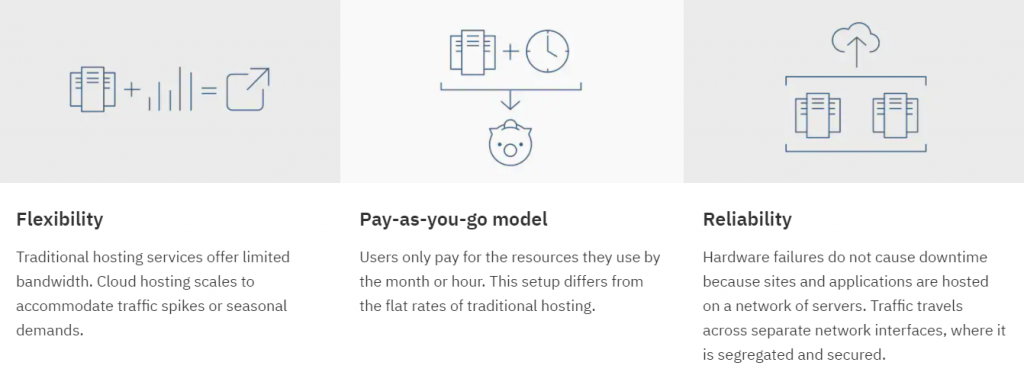What is cloud hosting?
Cloud hosting makes cloud resources available to apps and websites. Solutions are not placed on a single server, unlike traditional hosting. Instead, the application or website is hosted by a network of linked virtual and real cloud servers, allowing for more flexibility and scalability.
Key Features:
- Instead of a single on-premises server, applications and solutions are deployed over a cloud network.
- Resources can be scaled to meet the demands of the user.
- Organizations are only charged for the resources they consume.
- SQL (including MySQL) and NoSQL databases may be hosted in the cloud.
- APIs, online portals, and mobile applications are used to automate and control solutions.

Cloud hosting considerations
Security
Clients should look for a supplier that offers solutions for physical/operational, network and system, and application and data security.
Sensitive information
Enterprises that operate with sensitive data may want to explore isolating data at the hardware level, utilizing dedicated servers, or using other methods.
Support
Cloud hosting companies frequently provide tools and, in some cases, specialized services to aid in the management of the cloud-hosted environment.
Performance
Latency in performance might be a problem at times. Organizations should guarantee that their Internet connections are stable and dependable.


BEST CLOUD HOSTING
Cloud hosting plans resemble virtual private server (VPS) web hosting plans in that you pay for a specific amount of web space, RAM, CPU time, and bandwidth up front. However, because these resources are distributed across several devices rather than just one, altering your plan later – for example, adding another gig of RAM – is usually as simple as moving a slider, with the extra power coming online in seconds.
Additional small company web hosting choices exist, such as ecologically friendly green web hosting. Furthermore, cloud hosting is scalable and may be a suitable alternative to a dedicated server with a colocation provider, and managed web hosting services are available.
Everything from email hosting to updating your corporate server may be done with cloud hosting. If you want to get your hands dirty, anticipate the virtual servers to run Linux rather than Windows.
- Google Cloud
- Amazon AWS
- IBM Cloud
- Microsoft Azure
- Hostinger
- Hostgator
- Cloudways
- Bluehost
- Dreamhost

Technical View on the Cloud hosting and services
From an IT standpoint, both the customer and the service provider want the flexibility of quick solution deployment for changing business needs. It’s difficult to deploy a new solution within weeks in a well-established organization with a lengthy history of IT projects without significantly compromising current infrastructure or available financing. Cloud hosting offers the benefits of faster solution deployment as well as cheaper installation and operational costs.
Today’s businesses have enough expertise with cloud hosting to prefer it to traditional application deployment. It is not only faster to deploy in the cloud, but it also assures that the deployment’s scalability, availability, and performance requirements are met.
Cloud service providers (of which there are many) have also improved their services and delivery models, making it much easier to fulfill service-level agreements (SLAs) with more confidence and success. Cloud hosting solutions have emerged to provide centralized and streamlined IT management and services.
This centralized management method assists both the service provider and users in automatically creating, providing, and tracking SLAs over the web. The majority of cloud hosting services are given instantly through an easy-to-use, web-based user interface for software, hardware, and support requests. Updates to software and hardware can also be done automatically. It’s as simple as purchasing online!
As a result, cloud hosting continues to be a popular deployment choice for customers across all sectors. If you haven’t already done so, now is an excellent moment to investigate cloud hosting as a strategic alternative.





